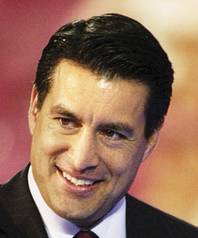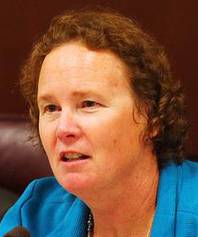Thursday, April 28, 2011 | 2:05 a.m.

Brian Sandoval

Sheila Leslie
Sun coverage
Sun archives
- State revenue forecasters to project an additional $72 million to offset budget hole (4-26-2011)
- Senate Republicans refuse to play ball on budget test votes (4-25-2011)
- First public budget debate before full Assembly ends in predictable stalemate (4-20-2011)
- New style of budgeting — probably not a new result (4-17-2011)
- Democrats take budget fight out of money committees, bring it to the floors of the Assembly and Senate (4-11-2011)
- Raggio-style deal-making a no-go this time (4-3-2011)
- Horsford doggedly attacks Sandoval’s budget cuts (3-29-2011)
- Horsford to lawmakers: ‘Talk about our revenue needs’ (3-28-2011)
- Brian Sandoval proposes budget fix; Democrats continue to hammer spending plan (3-28-2011)
- Counties fearful of Sandoval’s budget (3-8-2011)
- Republicans issue list of demands to be met before they'll talk taxes (3-3-2011)
- Democrats say Sandoval budget has $325 million hole (2-24-2011)
- Sandoval’s budget relies on at least one fee increase (2-10-2011)
- Gaming, mining industries become early targets for taxes (2-8-2011)
- Gov. Brian Sandoval’s budget means job, service cuts for Clark County (1-26-2011)
- State budget plan heavy on cuts, light on solutions (1-25-2011)
- Soft words during State of the State hide Nevada in pain (1-25-2011)
- State of the State: How doors could open for Nevada (1-24-2011)
- Is Brian Sandoval’s ‘shared-sacrifice’ budget the solution to state’s economic woes? (1-23-2011)
CARSON CITY — Lawmakers see gold in the hills — and government coffers — of rural Nevada.
Gov. Brian Sandoval is content to leave it there.
The state’s booming mining industry has some small, rural counties and school districts amassing huge sums of money.
Eureka County had $30 million in reserves last fiscal year, equal to 222 percent of its annual operating budget, according to statistics provided to the Legislature by the counties.
Eureka County School District said it had a $20 million reserve as of June 2009, according to a recent letter. (On Wednesday, Eureka Superintendent Ben Zunino said he did not know how much the district had in reserves.)
Sandoval’s budget leaves these dollars untouched, while it seizes hundreds of millions of dollars from Clark and Washoe counties’ governments and school districts to balance the state budget.
With the state facing a $2.3 billion budget deficit, the rural funds wouldn’t make a significant dent. But urban lawmakers are wondering why rural counties aren’t sharing in the sacrifice.
“We hear about shared sacrifice and shared responsibility,” said Sen. Sheila Leslie, D-Reno, chairwoman of the Senate Revenue Committee. “It seems like the citizens of Clark and Washoe are being asked to sacrifice more.”
Adding to the tension: Sandoval announced Tuesday he was restoring many health and human services cuts to rural areas — home, Democrats note, to key legislative swing voters who have expressed concern about cuts in the governor’s budget.
A joint Senate and Assembly committee will discuss today the rural counties’ untapped financial reserves.
An analysis by the Nevada Appeal found Clark County School District per-pupil spending last year was the lowest in the state, at $9,538. Esmeralda County School District, with 63 students, was the highest at $33,896 per student. And Eureka County School District spent $32,343 on each of its 237 students.
Zunino, the Eureka County school superintendent, attempted to explain some of the disparity, noting it costs more for transportation in rural school districts because students travel greater distances. And the districts don’t have the savings from economies of scale that larger districts have.
The district is saving excess funds, preparing for times when gold prices inevitably drop.
Yet Clark and Washoe counties, currently in the clutches of the worst recession in memory, are bearing the brunt of state lawmakers’ penchant to take money from local governments. To wit:
• Sandoval’s budget takes $302 million from school district bond reserve accounts. Of that, $220 million comes from Clark County School District; $60 million from Washoe County; and about $22 million from rural districts. None comes from Eureka, because it does not have outstanding bonds.
• Sandoval’s budget diverts property tax money from Clark and Washoe counties and the higher education system.
• The state is proposing to hand off responsibility for many services to the counties.
In total, Clark County officials say Sandoval’s budget will cost $242 million over two years, resulting in 650 lost jobs and eliminated services. (In an unintentional bit of symbolism, Clark County sent its coroner to lobby the Legislature.)
Sandoval’s chief of staff, Heidi Gansert, said the administration began working on the budget in November and had to present its plan in January. On that tight schedule, Sandoval’s team did not look at all sources of money to tap. Instead, it focused on school districts’ bond reserves that weren’t being used.
She said the plan presented by Sandoval “is sound and reasonable” and the administration would not favor raiding other local governments’ funds.
Asked if the budget burdens were fair to residents of urban counties, Gansert said, “We’ve never done that analysis.” Some rural counties might be doing well. But others “are among the hardest hit right now,” she said.
Assembly Minority Leader Pete Goicoechea, R-Eureka, said he’s not sure the state can legally single out rural counties that have benefited from mining.
“I don’t remember when gold was $250 an ounce Clark and Washoe saying, ‘We’ll help you out.’ ” Now that gold, which recently hit $1,500 an ounce, is high, “I don’t think it’s appropriate to go out and decimate rural counties, or any counties for that matter,” he said.

Join the Discussion:
Check this out for a full explanation of our conversion to the LiveFyre commenting system and instructions on how to sign up for an account.
Full comments policy